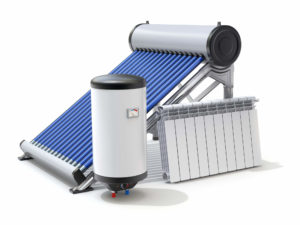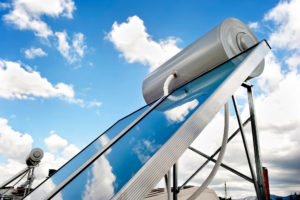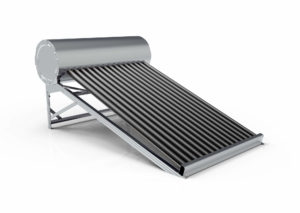It’s probably time you upgraded to a solar water heater. You are bound to experience so many benefits and are certainly not going to miss out on this.
The technology used to make them has matured over time; hence, the hot water provided is reliable.
Since everyone’s preference is different, your experience will undoubtedly not be the same as somebody else’s. You can be the judge; however, only after you install it.
To know what you are getting yourself into, you could research beforehand and even make inquiries from people who use it. That way, you will have a rough idea of how it works and the like. The following is a solar water heater buying guide.
Contents
- 1 Key Takeaways
- 2 What Is a Solar Water Heater?
- 3 How Does a Solar Water Heater Work?
- 4 How Effective Are Solar Water Heaters?
- 5 What Are the Different Types of Solar Water Heaters?
- 6 How Do I Choose the Right Solar Water Heater?
- 7 How Much Money Can I Save with a Solar Water Heater?
- 8 Can I Use a Solar Water Heater to Heat My Pool?
- 9 How Do I Maintain a Solar Water Heater?
- 10 What Is the Cost of Installing a Solar Water Heater?
- 11 Are There Any Limitations to Installing a Solar Water Heater?
- 12 How Long Does It Take to Install a Solar Water Heater?
- 13 Features to Look for in Solar Water Heaters
- 14 Case Study: Enhancing Home Efficiency with Solar Water Heaters
- 15 Expert Insights From Our Solar Panel Installers About Solar Water Heaters
- 16 Experience Solar Excellence with Us!
- 17 Conclusion
Key Takeaways
- Solar water heaters use solar energy from sunlight to produce hot water, making them eco-friendly and energy-efficient options for heating water.
- These heaters work by absorbing sunlight through thermal panels on the roof, converting it into heat, and passing it into a storage tank.
- Solar water heaters can be cost-effective, reduce utility bills, and provide hot water even on cloudy days, making them a sustainable choice for homeowners.
What Is a Solar Water Heater?
Solar water heaters are solar heating systems that use solar heat energy sourced from sunlight to produce hot water.
Solar water heaters are an excellent option for people who love eco-friendly and, better yet, energy-efficient things. In addition to that, they operate on a natural renewable energy source. Isn’t this amazing? This heater consists of a thermal panel, tank, and circulating pump.
The thermal panel is usually installed on the roof and is also known as a solar collector. On the other hand, the tank stores hot water while the circulating pump carries the solar energy from the thermal panel to the tank and a thermal regulator.
If you are never keen on environment conservation, solar water heaters would be the best decision you will ever make; hence, try it today.

How Does a Solar Water Heater Work?
If you have read this far, you are undoubtedly keen on learning more about solar water heaters, and knowing how they function is key. After all, you must know how it works to buy it.
Solar water heaters work by absorbing light through the solar collector, which is later converted into heat. The latter is passed into the tank by a circulating pump. This only occurs when the thermal panel is hotter than the water tank.
As a result, the circulating pumps do not use electricity unnecessarily; moreover, it hinders overheating. You must know that collectors are most efficient at midday when the collectors face south.
To be more specific, during the summer season, when the skies are cloudless. You must know that when the sun is inadequate, the backup system takes over.
Water is pre-heated and brought to the temperature required; thus, you will be going about your day as usual. The backup system can produce hot water at a constant temperature for a year and not emit even a bit of carbon dioxide.
Note that the circulation system and collector type usually describe solar water heaters. Also, there are different types of collector and circulation systems. The latter include passive, closed-loop, direct, and forced-circulation systems, while the collector types include the flat-plate, evacuated, and batch collectors, each with a function.
How Effective Are Solar Water Heaters?
There is nothing as good as knowing you have invested in an effective solar water heater. This is a common question that numerous clients make and is not a wonder because who does not love assurance anyway?
If the utility bills have been increasing and you don’t know how to reduce them and live the ideal life, installing a solar water heater could save you a fortune. This is because they use renewable energy and decrease the grid’s power need while providing lots of hot water volumes.
As previously mentioned, installing it will ascertain that you have hot water flowing throughout the year even when the skies are cloudy as they have a backup system.
Suppose you are without a doubt tired of those power and water shortages. The solar water heater system is the solution you have been waiting for. With time, you may decide to install solar panels and do away with the typical electricity system, which has quite the downsides.
What Are the Different Types of Solar Water Heaters?
Whether you want that solar water heater to fulfill your residential or commercial purposes, you will find one to meet your specifications. The two main types of solar water heaters are namely active and passive solar water heaters.
Active Solar Water Heaters
This type of solar water heater moves hot water from the solar collectors using a pump. Active solar water heaters are usually lodged in cold areas; therefore, there is hope if you reside in such areas and have never thought it was impossible.
With these heaters, the tank is stored indoors to hinder freezing. They are broken into two different types, including the active direct and indirect systems.
In the active direct systems, the water is directly heated in collectors, either in metal or glass tubes, and carried to your showerheads and faucets.
In the active indirect systems, a heat transfer fluid such as propylene glycol is heated, and the heat is transferred to the water supply that has a heat exchanger in a closed-loop system.
Note that while the transfer fluid is circulated in the system, heat loss takes place. Most passive systems entail a heater with no tank to act as a backup energy source that can be electric or gas.

Passive Solar Water Heaters
Unlike the active solar water heaters, these do not use circulating pumps to circulate hot water; instead, they depend on the circulation system’s convection.
In the latter, cold water sinks while the hot water rises to the surface: this enables water circulation. In essence, passive solar water systems tend to be cheaper than active ones. This is because the active solar water heaters use special equipment to pump water.
These are broken into two types, including the integral collector solar water heaters and passive thermosyphon systems. The latter use metal flat plate collectors to heat small amounts of water on the roof. Therefore, when you open the valves with hot water, it flows down to your faucets, usually designed to hold 40 gallons of water.
On the other hand, integral collector solar water heaters are made in isolated boxes with open tops that allow the sunlight to pave its way through. It then heats the water, which then flows into the plumbing system giving you access to hot water.
How Do I Choose the Right Solar Water Heater?
Reach Out To A Solar Manufacturer or Contractor
There is beauty in seeking help from experts! With technology at your beck and call, you can look for the best solar water heater companies online and contact them.
In such instances, talking to one solar company is never enough. There is so much to learn from each that will help you decide on the best one yet.
Ensure that they are a local company as this will give them access to your site where they can come and provide recommendations. They can also help you install the system or, better yet in maintaining it. Make inquiries where the need arises.
For example, ask for the cost estimates, references, and what have you. If you want quality services, ascertain that they are certified by the relevant authority.
If anything, you could check the company with your local Better Business Bureau. After all, who wants to second-guess such a huge investment? There is the need to be sure that what you see is what you get in the world you live in today; otherwise, you will be in for a disappointment.
Decide on the Type of Tank You Need
Besides looking at the capacity your tank can withhold, you should ascertain that it can withstand and retain heat for somewhat 60 to 72 hours.
The deemed fit tanks ought to be thick and have a food safety standard since it makes sure that the water won’t have a foul smell.
In addition to that, these tanks should be coated with enamel which prevents corrosion by hard water. In that regard, this is a factor to keep in mind after all; you don’t want to shower in foul-smelling water.
How Much Money Can I Save with a Solar Water Heater?
When going the solar water heater way, it is vital that you keep in mind that installing the solar water system can be quite costly in the region of $5,000.
However, as you advance, your costs will be low- the long-term goal every homeowner seeks to achieve. Solar water heaters can cut down the water expenses by 50-80%.
As if not enough, by the time you will be getting to your solar payback period, the water heater will be producing close to free hot water for the whole system’s lifetime.
However, if your wish to calculate, you will have to know the following:
- The amount of water needed by your family daily.
- How much hot water is used during the daylight hours.
- How much fueling your backup heater will cost you. Feel free to contact your utility company to get answers.
- The solar energy factor rating for the equipment required.
- How long your solar heating system will last. The longer the life span, the more money you will save.
The above points will aid in getting the solar water heater annual operating cost.

Can I Use a Solar Water Heater to Heat My Pool?
Indeed, and if you are using a conventional swimming pool heater, it is time for an upgrade. As much as solar water heaters are mainly used for sanitary facilities and residential purposes, it all goes down to the number of panels installed on the roof.
You will undoubtedly love the fact that this solar water heater can not only heat your home but your pool too. Isn’t that a good bargain? It is by far better than using gas or fuel heating because solar water heating is environment friendly; thus, it does not emit any greenhouse gases whatsoever or, worse yet, hazardous waste.
Therefore, you will be conserving the environment and making it a better place. Ditch that solar boiler and incorporate a solar water heater as it produces energy instead of heat.
To ensure that the water temperature in a pool is ideal, you will have to rely on a swimming pool heating solution. Also, solar heating a pool is free as the energy is inexhaustible, and as a result, saying no to this offer will be a loss on your side. Imagine how your electricity bills will reduce, and how long you will use your swimming pool?
How Do I Maintain a Solar Water Heater?
It will be crucial to maintain this solar water heater investment to your best of your ability if it is to last an extended period. Even though you will have the solar company to assure you that it is working at its optimum, you can also do regular inspection and replacement by looking for damaged elements on other days.
These elements may entail pumps, and controllers to mention but a few. While examining the system, you may come across signs of corrosion. Keep in mind that the heater is made of steel which can rust because water will constantly be flowing.
Anode rods protect water heaters from corrosion, but hard water makes them pointless as the tank can be corroded regardless. However, an annual inspection will ascertain that it is in its peak condition.
Replacements should be done every 4 to 5 years, and you can paint parts of the tank that are exposed every 2 to 3 years to counter corrosion.
Note that the tank will need replacing, although in a decade or so for maximum efficiency purposes. If your solar water heater requires repair services, ensure that you get them sooner than later.
What Is the Cost of Installing a Solar Water Heater?
The cost of installing a solar water heater may vary depending on various factors, such as the size of the system, the type of collector, and the location of your property. On average, the cost of installing a solar water heater ranges from $1,500 to $3,500. However, it is important to note that the long-term benefits of using a solar water heater outweigh the initial installation costs.
Are There Any Limitations to Installing a Solar Water Heater?
Yes, there are certain limitations to installing a solar water heater. For instance, if your property is in a shaded area, it may not receive enough sunlight to generate sufficient heat to warm the water. Additionally, if you live in an area with harsh weather conditions, such as frequent hailstorms or heavy snowfall, your solar water heater may get damaged. It is best to consult a professional to assess if installing a solar water heater is suitable for your property.
How Long Does It Take to Install a Solar Water Heater?
The installation of a solar water heater may take between one and three days, depending on the complexity of the system and the size of your property. However, it is important to note that the installation process may take longer if there are any unforeseen complications. It is recommended to hire a professional to install your solar water heater to ensure that it is installed properly and safely.
Features to Look for in Solar Water Heaters
Capacity
Estimate the capacity of water you use by knowing the one you use with the current water heater; this will affect the choice of the water heater.
You can find details on the capacity you use on the yellow energy guide sticker or the nameplate. That way, you can inform your solar system’s contractors.
User Friendly
When buying a solar water heater, you should ensure that it is user-friendly because only then will you wrap your head around it and use it accordingly.
You should not have to struggle to figure out how it works; if anything, you should look for something better; you don’t want to wreck it anyway!
Longevity and Durability
Long-serving equipment is excellent as it will make investing it worthwhile. after all, who wants to invest a fortune in something that will last short durations or have too many issues? Durability and warranty go hand in hand; therefore, stress on this factor.
Warranty
Like any other electronic you purchase, you must be sure the water heater comes with a warranty. The latter will ensure that you get a replacement if its issue is not fixable alongside many others.
Ensure you go for those brands that offer warranties for long durations. Once you see it has no warranty, continue with your search for the best solar water heater, as this is a red flag.
Case Study: Enhancing Home Efficiency with Solar Water Heaters
Background
At Solar Panels Network USA, we are dedicated to providing homeowners with sustainable energy solutions that reduce utility costs and promote environmental conservation. This case study illustrates how we successfully implemented a solar water heater system for a residential client, showcasing the benefits and effectiveness of this technology.
Project Overview
A homeowner approached us with the goal of reducing their energy bills and adopting a more eco-friendly lifestyle. They were interested in installing a solar water heater to provide hot water for their household needs. The primary objectives were to ensure a reliable hot water supply year-round and achieve significant savings on utility bills.
Implementation
We began by conducting a comprehensive assessment of the homeowner’s property, evaluating factors such as roof orientation, available sunlight, and existing hot water usage patterns. Based on this assessment, we recommended an active solar water heater system with flat-plate collectors.
Components Installed:
- Flat-Plate Collectors: Chosen for their efficiency and reliability in capturing solar energy and converting it into heat.
- Circulating Pump: Installed to facilitate the transfer of heat from the collectors to the water storage tank.
- Storage Tank: A well-insulated tank to store the heated water and ensure minimal heat loss.
- Backup Heating System: Integrated to provide hot water during periods of low sunlight, ensuring uninterrupted supply.
Steps Taken:
- Site Assessment: Evaluated the property to determine the optimal placement for the solar collectors and the most efficient system configuration.
- System Design and Planning: Designed a customized system that matched the homeowner’s hot water needs and maximized energy efficiency.
- Installation: Installed the solar collectors on the roof, connected the circulating pump and storage tank, and integrated the backup heating system.
- Testing and Optimization: Conducted thorough testing to ensure the system operated efficiently and made adjustments as necessary for optimal performance.
Results
The installation of the solar water heater system resulted in immediate benefits for the homeowner, including significant energy savings and a reliable hot water supply.
Performance Metrics:
- Energy Savings: The homeowner experienced a reduction in their monthly utility bills by approximately 60%, thanks to the efficient use of solar energy.
- Reliability: The backup heating system ensured a consistent supply of hot water even during cloudy days, providing peace of mind and comfort.
- Environmental Impact: The solar water heater system reduced the household’s carbon footprint by utilizing renewable energy and decreasing reliance on fossil fuels.
Summary
This case study highlights the effectiveness and benefits of installing a solar water heater system. By leveraging renewable energy, the homeowner achieved substantial cost savings and contributed to environmental sustainability. Solar Panels Network USA is committed to providing tailored solutions that meet the unique needs of each client, ensuring long-term satisfaction and energy efficiency.
Expert Insights From Our Solar Panel Installers About Solar Water Heaters
Switching to a solar water heater is a fantastic way to leverage renewable energy and cut down on utility bills. The technology has advanced significantly, ensuring reliable hot water throughout the year.
Senior Solar Installer
The effectiveness of solar water heaters depends greatly on proper installation and regular maintenance. Ensuring that your system is optimized for your specific location can make a big difference in its performance.
Lead Renewable Energy Consultant
Choosing the right type of solar water heater, whether active or passive, depends on your climate and hot water needs. Our team can help you determine the best system for your home to maximize efficiency and savings.
Solar Energy Technician
Experience Solar Excellence with Us!
Trust in Solar Panels Network USA, where our seasoned experts deliver top-quality solar solutions for homes and businesses nationwide. With a legacy of countless successful installations and a commitment to sustainable energy, we’re your reliable partner in the solar journey. Ready for a brighter, eco-friendly future? Call us now at (855) 427-0058 and harness the power of the sun!
Conclusion
The above points show a buying guide for solar water heaters. By now, you are well informed and could go and even make a purchase.
However, if you ever feel challenged, seek help from professionals.
Also, installing a solar water heater system is an excellent way to conserve the environment if you wonder what action you would take to ensure everyone a safe environment.
About the Author
Solar Panels Network USA stands at the forefront of solar energy solutions, driven by a team of seasoned solar engineers and energy consultants. With over decades of experience in delivering high-quality solar installations and maintenance, we are committed to promoting sustainable energy through customer-centric, tailored solutions. Our articles reflect this commitment, crafted collaboratively by experts to provide accurate, up-to-date insights into solar technology, ensuring our readers are well-informed and empowered in their solar energy decisions.

